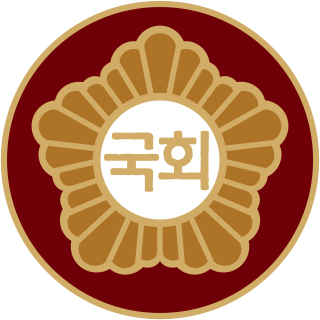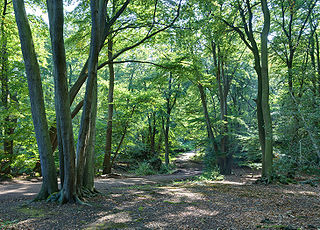This article does not cite any sources .(June 2014) (Learn how and when to remove this template message) |
Sikmogil is a holiday in South Korea, the Korean Arbor Day. It is celebrated annually on April 5. This day was designated by presidential decree in 1949 following legislation by the National Assembly.

South Korea, officially the Republic of Korea (ROK), is a country in East Asia, constituting the southern part of the Korean Peninsula and lying to the east of the Asian mainland. The name Korea is derived from Goguryeo which was one of the great powers in East Asia during its time, ruling most of the Korean Peninsula, Manchuria, parts of the Russian Far East and Inner Mongolia, under Gwanggaeto the Great. South Korea lies in the north temperate zone and has a predominantly mountainous terrain. It comprises an estimated 51.4 million residents distributed over 100,363 km2 (38,750 sq mi). Its capital and largest city is Seoul, with a population of around 10 million.

Arbor Day is a holiday in which individuals and groups are encouraged to plant trees. Today, many countries observe such a holiday. Though usually observed in the spring, the date varies, depending on climate and suitable planting season.

The National Assembly of the Republic of Korea, often shortened to the National Assembly in domestic English-language media, is the 300-member unicameral national legislature of South Korea. Elections to the National Assembly are held every four years. The latest legislative elections were held on 13 April 2016. Single-member constituencies comprise 253 of the assembly's seats, while the remaining 47 are allocated by proportional representation. Members serve four-year terms.
In 1960, Sikmogil's status as a holiday was abolished and April 5 was treated as any other day. However, the following year the official status of the holiday was restored. In 2006, Sikmogil's holiday status was abolished again.
The idea of Sikmogil was to celebrate forestry and the development of national history. The day of April 5 was chosen for its historical significance. On April 5, Silla achieved the unification of the Three Kingdoms of Korea.

Forestry is the science and craft of creating, managing, using, conserving, and repairing forests, woodlands, and associated resources for human and environmental benefits. Forestry is practiced in plantations and natural stands. The science of forestry has elements that belong to the biological, physical, social, political and managerial sciences.

Silla was a kingdom located in southern and central parts of the Korean Peninsula. Silla, along with Baekje and Goguryeo, formed the Three Kingdoms of Korea.

The concept of the Three Kingdoms of Korea (Hangul: 삼국시대) refers to the three kingdoms of Baekje (백제), Silla (신라) and Goguryeo (고구려). Goguryeo was later known as Goryeo (고려), from which the modern name Korea is derived. The Three Kingdoms period was defined as being from 57 BC to 668 AD.
On Sikmogil, South Korean people plant trees that are appropriate for the region's climate. Government offices help people plant trees. During the month of Sikmogil, the government encourages the economical utilization of forestry by designating a "National Planting Period." Even though Sikmogil was abolished in 2006 as a holiday, the South Korean public continues to take part in meaningful activities.












